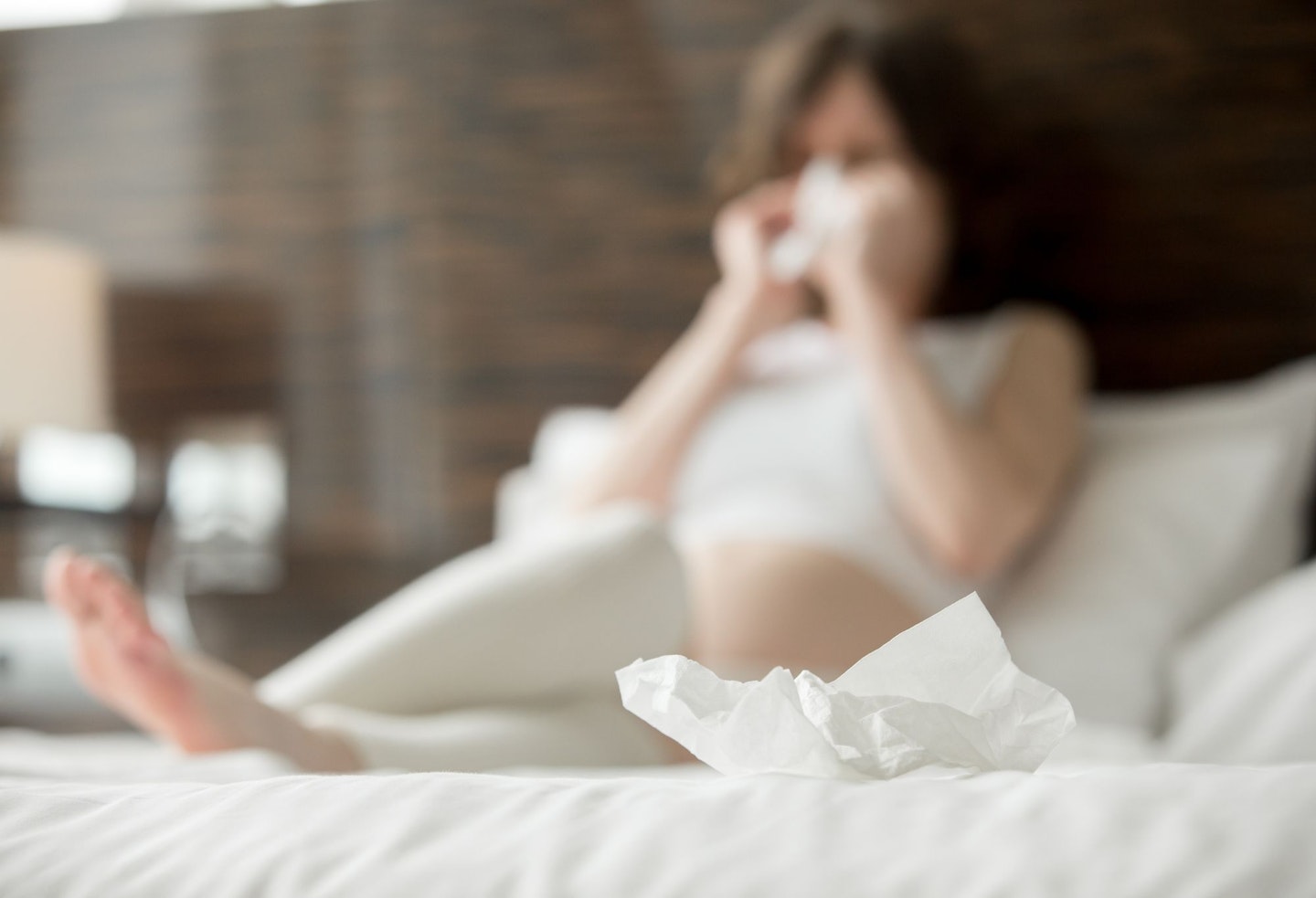Catching a cold is never pleasant. The average adult will catch two to three colds a year and when you’re pregnant this can increase due to changes in your immune system.
For many mums-to-be this can cause concern and panic, but a common cold is unlikely to be serious for you or baby and there are ways that you can give yourself some relief.
Here's our definitive guide on how to get rid of the pregnancy sniffles, with all your questions answered.

Am I more likely to catch a cold during pregnancy?
In short, the answer is yes.
"The way our bodies work when we're pregnant is that our immune system changes and is effectively suppressed and that's to help protect the pregnancy, but what that does means is that we're more susceptible to viruses and bacterial infections, so catching things like a cold," says obstetrician and gynaecologist Dr Ellie Rayner, founder of The Maternity Collective.
"Also, the reason you may be more likely to get a cold, pregnancy cough or chest infection is because as your bump grows and your pregnancy progresses there's an increasing amount of pressure on your diaphragm (the muscle in your chest) and also your lungs, reducing your ability to take deep breaths.
What that means is that you're more likely to collect bacteria at the bottom of your lungs and when you're pregnant you're not able to take such deep breaths and clear your lungs, which is why you can be more susceptible to nasty chest infections like flu or pneumonia," she explains.
Does my cough or cold affect my baby?
Having a normal head cold, whilst making you feel miserable, should not affect your baby.
"As long as you've got the normal symptoms of a cold and you're not feeling out of breath or light-headed, or you've not got a headache or blurry vision and are able to eat and drink it’s fine," says Dr Ellie.
Adding, "It's only when you're having a very high temperature or you're feeling unwell, unable to get out of bed, or your breathing is distressed and you can’t keep food or fluid down, that you should see your doctor or midwife."
The NHS says you should start to feel better within one to two weeks.
How can I tell if it's a cold or flu?
With a cold, you will have:
-
a sore throat
-
a blocked or runny nose,
-
sneezing and a cough
You might also experience a mild fever or a headache, although these symptoms are not as common.
As a general rule, the flu comes on faster. It causes:
-
a higher fever
-
a headache
-
muscle aches
-
sweating
-
leaves you feeling exhausted
"Flu can be very serious in pregnancy and that's why it's important if you’re pregnant and you’ve got a high temperature or a cough that's not going away or you’re feeling generally unwell that you see your midwife or doctor," says Dr Ellie.
"It’s also why pregnant women are included in the groups of individuals eligible to get the flu vaccine and are recommended to get it every year," she adds.

What medication is safe to take?
It’s best to avoid all medications in the first 12 weeks of pregnancy. After that, here's what you can and can't take.
Safe:
-
A low dose of pain killer, only for as long as needed. Paracetamol is considered the safest painkiller to take in pregnancy.
To avoid:
-
Antihistamines
-
Ibuprofen
-
Aspirin
-
Cold cure tablets/drink sachets
"If you do have a temperature, you can take paracetamol," says Gill Adgie, regional head of Royal College of Midwives. "This is safe for pregnant women to take and will help reduce your fever." The NHS advises using paracetamol at the lowest effective dose, for the shortest possible time.
"You should avoid antihistamines, ibuprofen and aspirin during pregnancy," says Boots flu pharmacist Deepa Songara.
Watch out for cold cure tablets or drink sachets. As well as containing paracetamol (which is safe), they also contain phenylephrine, a decongestant which has blood vessel constricting properties that could restrict blood supply to your placenta.
"For sore throats and coughs try lemon juice and honey mixed with warm water, or a throat lozenge or cough mixture containing glycerine, while some nasal sprays can help to defend against winter germs and reduce the severity of a cold or the flu, but always check first with your pharmacist for what is suitable," says Deepa.
If your problems do persist, give your GP a ring to see if you should book an appointment to get checked over.
Lemsip when pregnant, is it safe?
Lesley Bland, Registered Midwife and Consultant Midwife for My Expert Midwife strongly advises to take regular paracetamol to help reduce your temperature and manage pain, but she says, “to avoid flu and cold remedies such as Lemsip as they contain decongestants that are contraindicated in pregnancy. You should also avoid ibuprofen at all times during your pregnancy as this can be harmful to your unborn baby.”
What natural remedies can I try?
Instead of medicine, you can try soothing the effects of your cold with at-home natural remedies. However, these are not evidence-based and only classed as supportive care.
-
Vapour rubs
-
Menthol sweets
-
Vitamin C tablets
-
Steam inhalation
-
Gargle with salt water
"Try vapour rubs and menthol sweets to clear congestion," says Gill. "Taking vitamin C can also be beneficial as it’s full of antioxidants and helps protect cells and keep them healthy."
Steam inhalation is another brilliant way to help feel better. Sit with your head over a bowl of hot water, place a towel over your head, close your eyes and breathe deeply. This should loosen the mucus and make it easier for you to breathe.
As well as these remedies, it's also a good idea to get plenty of sleep and rest and don't forget to drink plenty of fluids. Drinking ginger tea during pregnancy has many benefits and it can also help soothe sore throats.
What can I do to avoid catching a cold?
As a cold is a virus and spread by tiny droplets in the air which are released when someone sneezes or coughs, technically you can’t prevent catching it.
However, Dr Ellie suggests a few ways that we can try and avoid it:
-
Have good hand hygiene and make sure to wash them regularly with warm water and soap
-
Avoid anyone that's unwell or suggestive of a cold or flu
-
Try not to let yourself get run down
-
Strengthen your immune system by eating a balanced diet, exercising regularly and avoiding smoking. This will increase your general health and improve your immune system and your body’s ability to fight infection.
When to seek medical advice
You should start to feel better within a couple of weeks, however, the NHS advises to seek medical attention if you experience the following:
-
your symptoms do not improve after 3 weeks
-
your symptoms get suddenly worse
-
your temperature is very high or you feel hot and shivery
-
you're feeling short of breath or develop chest pain
About the experts
Dr. Ellie Rayner is an Obstetrics and Gynaecology specialist based in Devon and the founder of The Maternity Collective. With a degree in Medicine and Surgery from the University of Exeter and full Membership in the Royal College of Obstetricians and Gynaecologists, Dr. Rayner brings extensive experience in maternal health, supporting women throughout pregnancy and birth with a focus on holistic, informed care.
Gill Adgie has dedicated her career to midwifery since 1984, serving the Sheffield area before joining the Royal College of Midwives in 2006. Now the RCM Regional Head for northern England, Gill is a strategic leader advocating for high standards in midwifery care and workplace well-being.
Deepa Songara is a Boots flu pharmacist, she specialises in helping people stay healthy during flu season.
Lesley Bland is a Registered Midwife and Consultant Midwife for My Expert Midwife. She began her Midwifery career working in large teaching hospitals rotating through all clinical areas with particular emphasis on antenatal and intrapartum care.
About the author
Having graduated from the University of Gloucestershire with a first in Journalism, Mother and Baby Digital Writer Bryony Firth-Bernard went on to work as a reporter at Heart Radio West before becoming the lifestyle intern across Good Housekeeping, Prima and Red magazine.
